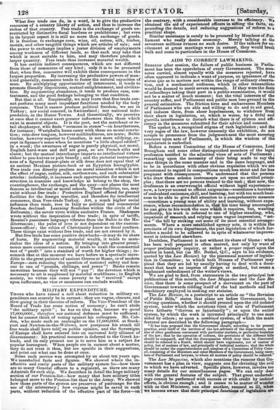MILITARY EXPENDITURE.
Moss who have raised a talk about reduction in military ex- penditure can scarcely be in earnest : they are vague, obscure, and slow-going in their theories of reform. The Vice-President of the Board of Trade has some notion of economy ; be can't abide "the military spirit " ; he has an idea that, because we spend 17,000,0001., therefore our national defences must be sufficient : but he cannot think of voting against his colleagues. Mr. Cob- den, who made such an onslaught on the 17,000,0001. at Stock- port and Newton-in-the-Willows, now postpones his attack till free trade shall have told; on public opinion, and the Sovereigns of Europe shall have entered into an universal holy alliance of disarmament : his practical measure is deferred to the Greek ka- lends, and its only present use is to serve him as a subject for popular harangues. When people are in earnest about a matter, they do not treat it thus, but are specific in their suggestions, and point out what can be done at once.
Some such service was attempted by us about ten years ago. We marshalled facts and figures. We showed where the in- effective and costly parts of the military system lie—how there are so many General officers to a regiment, as there are many Admirals for each ship. We described in detail the huge military section of our Pension-list—how many that bore military titles belonged more to the Pension-list than to the Army. We showed how those parts of the system are preserves of patronage for the use of the aristocracy ; how expense might be saved in such parts, without reduction of the effective part of the force—on
the contrary, with a considerable increase to its efficiency. We obtained the aid of experienced officers in sifting the facts, ex- pounding the details, and reducing suggestions of reform to a practical shape. Similar assistance is surely to be procured by Members of Par- liament who really desire economy. Merely talking at the seventeen millions evinces no such desire. If the talkers for ex- citement at great meetings were in earnest, they would break bulk and come to particulars in the House of Commons.


























 Previous page
Previous page